#lm 1.1.2
Text

m. bienvenue my beloved
#les mis letters#the next dozen entries are a continuation in this vein and i for one cannot wait#les miz#the brick#les misérables#les mis#lm 1.1.2
1K notes
·
View notes
Text
Today’s chapter, especially the part where M. Myriel exchanges his episcopal palace for the hospital, brought to mind something I saw at the Museum of Medical History in Rouen. (In fact, the museum is called Musée Flaubert et Histoire de la Médecine—it might sound odd, but it's incredibly informative and worthwhile. If you're ever in Rouen, don’t miss it.) They reconstructed a nineteenth-century infirmary, complete with a huge bed meant for 6 to 8 people (see the photo below). It’s hard to imagine how they could fit there! Such places were terribly overcrowded, making the episcopal palace a more fitting location for a hospital.
One thing that bothered me while reading (which @shsenhaji also touched on today) is that although M. Myriel’s decisions about his expenses are incredibly kind and generous, and probably beneficial for the souls of everyone in his household, it’s not ideal to do it at the expense of his sister and Mme Magloire. The latter was elated about the 3000 francs: “Good. Monseigneur began with other people, but he has had to wind up with himself, after all. He has regulated all his charities. Now here are three thousand francs for us! At last!” Since he isn't the one handling the household finances, it might be difficult for him to grasp the challenges of running even a small house with almost no money.
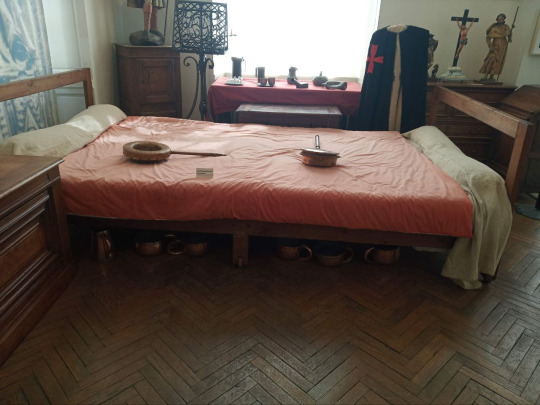
57 notes
·
View notes
Text
I was reading @lesmisletters and here’s a poll related to Volume 1 Book 1 Chapter 2, M Myriel Becomes M. Welcome!
57 notes
·
View notes
Text

#my posts#les mis#les miserables#victor hugo#lascelles wraxall#wraxall translation#lynd ward#bishop myriel#lm 1.1.2
53 notes
·
View notes
Text
Les Misérables - 1.1.2: Monsieur Myriel Devient Monseigneur Bienvenu
Day two of posting about Les Mis Letters 2024, and today I have actual Thoughts!
My overall impression is that I'm enjoying the original French a lot better. I'm definitely able to pick up a lot more nuances, and I'm glad I decided to go this route in 2024.
First main thought: Monsieur Bienvenu is very much not the same thing as Monseigneur Bienvenu, and I have some Feelings about the fact that the English translation (at least for Les Mis Letters) does not carry that over.
Of course, those who are more knowledgeable about the ins and outs of this translation and the others are free to jump in, but I wouldn't have thought it would be so hard to just go with Monsignor Bienvenu, or even keep Monseigneur Bienvenu. The title for me makes a very big difference, in terms of the character and what Victor Hugo is trying to do. Especially since, as the chapter title says, Myriel goes from Monsieur to Monseigneur from the will of the people of Digne.
His new title also is part of the theme that we are presented with in the very first chapter, of having to overcome first impressions or being judged in a skewed fashion - either too harshly or too well - by others; I think the English version does the reader and the story a disservice for not keeping that specific word.
My second main thought is that I was able to grasp a lot more nuances this time around, such as the fact that in M. Myriel's budget, there are several items that have to do with prison rehabilitation and improving prison conditions and freeing fathers imprisoned for debt. As I told my friend, who is reading Les Mis in French for the first time with Les Mis Letters (not his first re-read, though), the foreshadowing is not subtle at all. We love to see it :)
I also do like how this budget helps makes Monseigneur Bienvenu's actions regarding Jean Valjean later on much more understandable. He's already for helping ex-convicts already, if only in theory. As we see later, Myriel's lofty thoughts and principles don't always come through to real-life issues, especially when he has a personal bias, but having that mentality of wanting to help out is already very important. It's also very sad, because all the money in the world doesn't help out very much in this case, as we see again and again throughout the book when encountering systemic and societal issues.
Finally, as many others pointed out last year and this year, the fact that Myriel does all of this charitable work at the expense of his sister and his housekeeper, and not even giving them a choice in the matter, is kind of sad.
Not only does this self-sacrificial impulse negatively impact these two, who already don't have much agency in their world, but it's also that he doesn't seem to realize that they may want him to have some things as well. The line "Bon, dit-elle à mademoiselle Baptistine, monseigneur a commencé par les autres, mais il a bien fallu qu’il finît par lui-même" [“Monseigneur began with other people, but he has had to wind up with himself, after all."] really stood out to me.
My friend rightly pointed out that "when self-sacrifice turns into sacrifice of others, you've gone too far," which I think is true in this case and is even more obvious later on. I really wonder where a certain Jean Valjean gets it from... It's a total mystery...
Last parting thoughts: I liked how the relationship between mademoiselle Baptistine and M. Myriel was described in French a lot better than I did in the English version; for whatever reason, it sounded less sketchy and more heartwarming, though I couldn't say exactly why: "Pour cette sainte fille, M. de Digne était tout à la fois son frère et son évêque, son ami selon la nature et son supérieur selon l’église. Elle l’aimait et elle le vénérait tout simplement."
All in all, I'm very glad I was able to listen to this chapter today - I was so engrossed while listening to the story that I totally stood while doing nothing else for more than five minutes just listening to the narrator tell me all about our bestie Monseigneur Bienvenu. 😆
I hope to have more thoughts tomorrow!
22 notes
·
View notes
Text
Les Misérables - ‘M. Myriel Becomes Monseigneur Bienvenu’
There’s a couple things that stand out to me in this chapter.
First, the dining hall - one single room within a large mansion - specifically is focused on, and the bishop estimates it will hold 20 beds. There are 26 in the hospital. I feel this sets the reader up to expect that 20 patients will be put in the dining hall, and the other 6 will remain in the hospital - a great improvement, and one where the the bishop will sacrifice some dignity of entertaining in state, but will still have a comfortable life. This makes the bishop’s actual, much more sweeping decision - the hospital will have all of the palace, and he will move into the hospital - a true sacrifice of comfort - much more striking.
The next is how the bishop phrases this - not as charity, but as justice, as the restoration of what should be. He is not giving them the palace, it is naturally theirs.
“There is a mistake, I tell you. You have my house, and I have yours. Restore mine to me; you are at home.”
This is the same attitude he will evince later when Valjean steals the silver: “I have for a long time wrongfully withheld the silver; it belonged to the poor. Who was this man? A poor man evidently.”
The ‘regulation of the bishop’s household expenses’ is similar - it starts out with amounts that would be substantial but leave him comfortable, then works up to, 1000 livres for fathers of families imprisoned for debt, 2000 to supplemeng the salaries of poor schoolmasters, 1500 for free instruction of poor girls, and finally, the crowning amount, 6000 for the poor.
Having given up all but the minumum for his own needs, the bishop continues his charity by implementing, as far as his powers allow, a system of redistributive taxation:
In regards to the official perquisites, marriage licenses, dispensations, private baptisms, and preaching, consecrations of churches or chapels, marriages, etc., the bishop gathered them from the wealthy with as much exactness as he dispensed them to the poor.
And his example inspires others within his diocese to donate as well, through him, to assist those in need.
And even all this is not enough to provide for all the poor of his diocese! (Everything was given away, so to speak, before it was recieved, like water on thirsty soil.)
I like the name given to him, Monsiegneur Bienvenu (‘Lord Welcome’, I think, would be the translation, with Welcome being treated as his first name; and I think the text implies that it is one of his given names?)
16 notes
·
View notes
Text
Will say something more about this later, but honestly, the guy getting angry about myriel asking for extra money for his carriage is kind of right even in the context of myriel not using the money on himself – public funds shouldn't be used on private charity
It ties into that whole thing of Myriel being the furthest you can push how to do good under the old system and that isn't good enough – revolution is necessary
18 notes
·
View notes
Text
Me: Hugo isn't obsessed with details, you are just lazy fucks
Hugo: In the dining-room, a long and superb gallery which was situated on the ground-floor and opened on the gardens, M. Henri Puget had entertained in state, on July 29, 1714, My Lords Charles Brulart de Genlis, archbishop; Prince d'Embrun; Antoine de Mesgrigny, the capuchin, Bishop of Grasse; Philippe de Vendome, Grand Prior of France, Abbe of Saint Honore de Lerins; Francois de Berton de Crillon, bishop, Baron de Vence; Cesar de Sabran de Forcalquier, bishop, Seignor of Glandeve; and Jean Soanen, Priest of the Oratory, preacher in ordinary to the king, bishop, Seignor of Senez.
#bare minimum of world building#les mis letters#trying to join but with a huge delay#take notes fanfic writers#do you also have a century long backstory of one dining room that a minor oc visited once in the beginning of the story or are you normal#bishop myriel#les miserables#i guess i should tag this as#lm 1.1.2#?#victor hugo
17 notes
·
View notes
Text
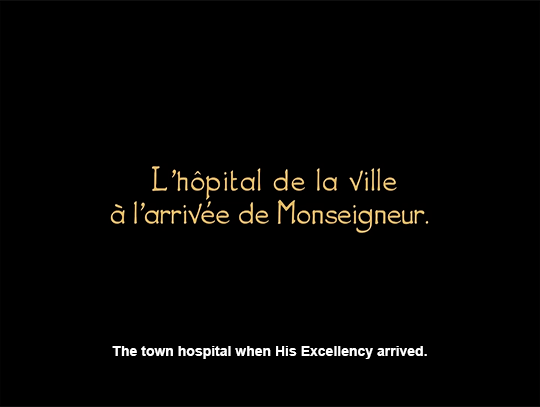
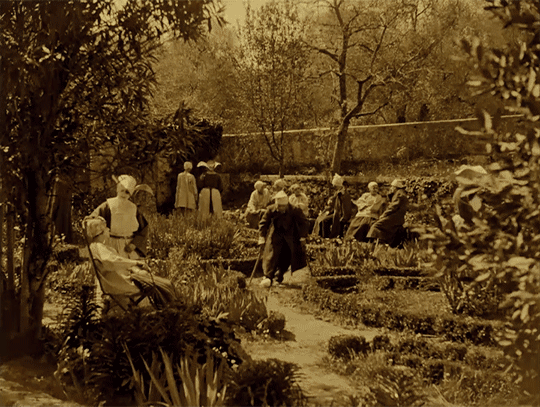
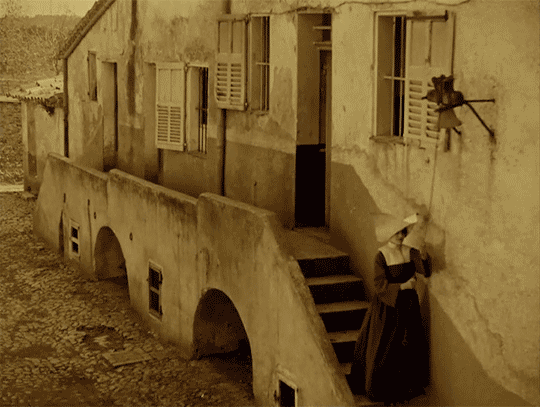
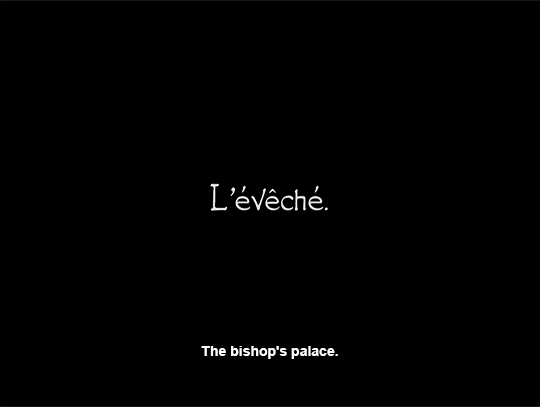


LES MIS LETTERS IN ADAPTATION - M. Myriel Becomes M. Bienvenu, LM 1.1.2 (Les Miserables 1925)
The episcopal palace of Digne adjoins the hospital.
The episcopal palace was a huge and beautiful house, built of stone at the beginning of the last century by M. Henri Puget, Doctor of Theology of the Faculty of Paris, Abbé of Simore, who had been Bishop of Digne in 1712. This palace was a genuine seignorial residence. Everything about it had a grand air,—the apartments of the Bishop, the drawing-rooms, the chambers, the principal courtyard, which was very large, with walks encircling it under arcades in the old Florentine fashion, and gardens planted with magnificent trees. In the dining-room, a long and superb gallery which was situated on the ground floor and opened on the gardens, M. Henri Puget had entertained in state, on July 29, 1714, My Lords Charles Brûlart de Genlis, archbishop; Prince d’Embrun; Antoine de Mesgrigny, the capuchin, Bishop of Grasse; Philippe de Vendôme, Grand Prior of France, Abbé of Saint Honoré de Lérins; François de Berton de Crillon, bishop, Baron de Vence; César de Sabran de Forcalquier, bishop, Seignor of Glandève; and Jean Soanen, Priest of the Oratory, preacher in ordinary to the king, bishop, Seignor of Senez. The portraits of these seven reverend personages decorated this apartment; and this memorable date, the 29th of July, 1714, was there engraved in letters of gold on a table of white marble.
The hospital was a low and narrow building of a single story, with a small garden.
#Les Mis#Les Miserables#Les Mis Letters#les Mis Letters in Adaptation#LM 1.1.2#Les Mis 1925#Les Miserables 1925#lesmisedit#lesmiserablesedit#lesmis1925edit#lesmiserables1925edit#pureanonedits#the SETS of 1925!!#I wish this kept the order and impact of the brick though.#Oh well.
19 notes
·
View notes
Text
1.1.2 "Monsieur Myriel Becomes Monseigneur Bienvenu"
I love bishop chapters. I want to live in bishop chapters forever.
finally googled the list of Important People Who Visited Digne In 1712 and it seems like this fancy banquet did in fact happen?? or at least all these people are real. which leads me to believe the commemorative tablet was actually there?? wild! love very much the idea of this actual fancy bishop's palace becoming a hospital.
I was struck this time by the conversation between Myriel and the hospital director. it's previously read a little comedic to me, like Myriel knows exactly where the director is going and is just humoring him by letting him get to the point? but this time it read more like an overworked, underfunded man repeating the same talking points he's used on the last six important people that visited, who presumably all sounded sympathetic but did nothing; Myriel's answers read like a man observing and actually Seeing this hospital's plight. the director's "we just have to resign ourselves to it" was a bit of a gut punch - I know all too well this feeling of repeating the ways a systemic issue affects those in need, receiving nothing but empty sympathy, and realizing you could talk yourself hoarse without changing anything, because we depend on the privileged and those in charge to give us what little we get (and usually that's nothing). Except!!! this time Myriel Listens. and he takes the question "what can we do" seriously rather than just hearing the director's resignation. and he Does Something.
also noticing for the first time that Myriel's budget specifically provides for those three categories of people from the Thesis Statement Preface - women (especially mothers), prisoners/laborers, and the education of children (including girls!)
laughing out loud for real at "(Relations with Rome were touchy at that time.)"
"As there is always more misery at the lower end than humanity at the top, everything was given away before it was received, like water on parched soil." again, the top has all the money and power and no desire to use it for anything other than their own interests. Hugo really said "eat the rich".
Myriel himself says that "the 'welcome' of Bienvenu counterbalances the Monseigneur". Later we'll see him be pretty scathing to some clergymen of the type he's referencing here (and that the bourgeois former senator accused Myriel of being). I love that he has no qualms about calling people out for valuing the politics of the Church above actual Christian (as in truly Christ-like) values.
9 notes
·
View notes
Text
LM 1.1.1, LM 1.1.2
LM 1.1.1
"The ruin of the French society of the olden days, the fall of his own family, the tragic spectacles of ’93, which were, perhaps, even more alarming to the emigrants who viewed them from a distance, with the magnifying powers of terror.."
I know I mentioned it around the Preface chapter but again it's really striking to me that Hugo was, at this point, an exile , viewing the things going on in France from a distance. I don't know off the top of my head if this line was in the '43 manuscript or new, but it sure feels relevant to '62 Hugo...
I really like how much Myriel becomes a Man of Mystery-- we know he has a big Come to The Church moment, and that's it, and does any of the rest matter? It almost feels like a challenge--we're going to see what he *does*; should we, after all, care about what was said about him?
Mademoiselle Baptistine was a long, pale, thin, gentle creature; she realized the ideal expressed by the word “respectable”; for it seems that a woman must needs be a mother in order to be venerable.
-- I strongly suspect that this is a joke/pun about the ranks of nuns; that is, that only a "mother" can be "venerable" , as in "Venerable Mother". I do not however know squat enough about Catholic titles to be really sure--can anyone help out?
Translation notes:
Hapgood inexplicably translates Myriel being "noblesse de robe" as "nobility of the bar". "Noblesse de robe" was a real, specific thing; more usually translated as "nobles of the robe", they were aristocrats attached to an office. "Noble of the bar" sounds like a joke about a lawyer who drinks a lot.
LM 1.1.2
Apart from everything else about the hospital/Bishop's mansion swap, I can't get over how without that, Magloire would have been in charge of cleaning a multi-story mansion all on her own, for, apparently,zero wages? or is the church paying her directly? I have many questions!
--In fact that is, for me, an effect of Hugo's super-detailed style! With a lot of authors, I never feel any need to gather more info than exactly what they give me-- everything is spare and stripped down and it feels like if it's not on the page, it's not important. But Hugo's absolute maximalist style invites questions, for me-- he mentions A-F, H , and the L-Z, so why not G, etc? Obviously, because one has to move on at some point, but somehow the more detail I get here, the more I want!
One detail I'd LOVE to know more about for this chapter: is the Bishop setting up household expenses like this a normal thing for the Bishop to do! In a regular household of the time, I'd definitely expect Mlle. Baptistine to be arranging the budget--that would be part of her role as head of the household, although of course her brother would have final authority. But this is a very specific household, and while obviously Church tradition can't count on every Bishop having a sister or female relative along, I wonder if this is something that would normally be done by a junior clerical type?
This holy woman regarded Monseigneur of Digne as at one and the same time her brother and her bishop, her friend according to the flesh and her superior according to the Church. She simply loved and venerated him.
-- first use of the "loved and venerated" phrasing that will repeat in various places in the text! ...I don't feel like that's actually a spoiler XD But I love Hugo's use of phrases repeating like little leitmotifs!
a senator of the Empire, a former member of the Council of the Five Hundred which favored the 18 Brumaire, and who was provided with a magnificent senatorial office in the vicinity of the town of Digne, wrote to M. Bigot de Préameneu, the minister of public worship, a very angry and confidential note on the subject, from which we extract these authentic lines:—
I really want to know where Our Narrator is getting these Authentic Lines!
But also: M. Bigot de Preameneu. That is a Dickens-level on -the-nose name there.
Translation notes:
We do not claim that the portrait herewith presented is probable; we confine ourselves to stating that it resembles the original.
Sigh. this isn't wrong but it just loses the echoing words of the original (Nous ne prétendons pas que le portrait que nous faisons ici soit vraisemblable; nous nous bornons à dire qu’il est ressemblant.) My favorite English version of the line I've seen goes along the lines of "We do not say that this portrait is very likely; only that it is very like." , but even there, I think this is just one of those things where translation has a Struggle? Realizing that I'm gonna start noticing more of those is a real mixed bag ><;
59 notes
·
View notes
Text
Madame Magloire liked to call him Your Grace [Votre Grandeur]. One day he rose from his armchair, and went to his library in search of a book. This book was on one of the upper shelves. As the bishop was rather short of stature, he could not reach it. “Madame Magloire,” said he, “fetch me a chair. My greatness [grandeur] does not reach as far as that shelf.”
--Les Miserables, Victor Hugo, 1.1.4
*whispers loudly* Possibly my favorite joke in the whole book. 😂
There's so much I love about the bishop, but his sense of humor is possibly my favorite thing about him. The conversation he has with the head of the hospital in 1.1.2 reads like a comedy routine being performed for an audience of the two speaking those lines. And his humor pokes fun mostly at himself and the inflated image everyone assumes a bishop to have, like in 1.1.3 when he says he rides the ass not from vanity and asks the people to forgive him for riding the same animal that Jesus rode.
He humbles himself with his actions and his humor and that leaves him ever more accessible to everyone who needs him, and I definitely feel SOME KIND OF WAY ABOUT THAT. ALWAYS. TT^TT
...ok maybe I do have a few things to say after all? XD
OH WAIT I FORGOT SOMETHING:
He said, moreover, “Teach those who are ignorant as many things as possible; society is culpable, in that it does not afford instruction gratis; it is responsible for the night which it produces. This soul is full of shadow; sin is therein committed. The guilty one is not the person who has committed the sin, but the person who has created the shadow.”
--(Same book and chapter)
This one ALSO hits me SOME KIND OF WAY, but I'm not awake enough to discuss it now. OTZ
33 notes
·
View notes
Text
LM 1.1.1, 1.1.2, 1.1.3
"She was a soul rather than a virgin. Her person seemed made of a shadow; there was hardly sufficient body to provide for sex; a little matter enclosing a light; large eyes forever drooping;—a mere pretext for a soul’s remaining on the earth."
torn between "what is going on here" and "wish that were me"
also the spanish translation I have translates it as 'she was, even more than a virgin, a soul' and I like that
"In the course of these trips he was kind and indulgent, and talked rather than preached"
I think I've read someone say this somewhere but I love how well this quote describes him and how it makes clear he's not trying to scare or shame people into being better, he just genuinely wants to help them < 3
3 notes
·
View notes
Text
Brickclub 1.1.2 “M. Myriel Becomes Monseigneur Bienvenu”
I love these little fairy tale snippets about the bishop. I think they’d bother me more for being too perfect if I didn’t know the perfection at the beginning of this book is a bright spot we’re going to be walking a long, long way from.
As it is, they’re so wholesome and sweet and so narratively satisfying in a perfect folkloric way. Everybody sets Myriel up with perfect one-liners, and Myriel always delivers by being exactly as kind as we could want.
(..With that shadow that Hugo probably can’t see at all, where all the women in his life are praised for their perfect subservience. Ugh, Hugo.)
That wealthy senator who complains about the bishop’s wealth seems worth a note. I had to look up his political context a bit: Hugo is saying he was a member of the Directory who participated in the coup that overthrew the Directory for Napoleon. According to this Napoleon forum I’m skimming, the man the senator wrote the angry letter to, M. Bigot de Preamenu, seems to have been a Minister of Public Worship, to whom Napoleon sent angry letters whenever a bishop did something he didn’t like. That seems Probably Significant. But so, I suspect, is the fact that the guy’s name is “Bigot.”
I love the line early on when Myriel and the hospital director are talking about how utterly insufficient the hospital accommodations are, and then
“What can we do, monseigneur?” said the director; “we must be resigned.”
It may be a way of asking for a donation, I’m not sure, though certainly he has zero expectation of Myriel upending everything by handing over his palace. But that line is such a thesis for what this book is trying to fight: sorrowful resignation to the suffering of the poor and an inability to imagine change to the status quo.
And the solution here is that Myriel, born a rich man and now a rich man again, gives away so much money that he’s poor. It feels less like an argument for charity than argument for radically redistributing wealth--charity tends to mean rich people stay rich and also buy power over whatever they’re funding. This is more like funneling government funds directly towards the people most in need.
Myriel is good enough to redistribute his wealth without being prompted, and he’s wise enough to do without being judgmental--he includes here provisions for prisoners and impoverished mothers, the two people we’re going to see society hate a whole lot pretty soon.
It feels like this idea of redistributing wealth is a thesis that keeps getting transformed in this story: Madeleine is going to try to follow Myriel’s model, but he’s a lot more flawed. His money gives him power, and so he makes the rules about moral behavior that get Fantine fired.
Later, the students are going to use violence to try to do Myriel's work on a broader scale. Myriel maybe wouldn’t exactly approve of violence even for that end... but that conversation is coming too. (I love the Conventionist so much.) I feel like even at this early stage we’re being led through slow, gentle steps towards realizing why the students are right.
(And so: what does it mean that the book ends with speeches praising bourgeois wealth and individual happiness? That’s another thing I’m reading for in this readalong: How does the ending of this book work, and what does it mean?
I suspect Myriel and Gillenormand are deliberate foils of each other--they’re the same age, they both live with a single female relative, etc. When Gillenormand seems to be winning all the arguments of the book just by virtue (“virtue”) of having outlived 90% of the cast, I think it’s worth looking back here and remembering all the ways this beginning makes it clear Gillenormand is not the moral winner or anything close to it.)
35 notes
·
View notes
Text
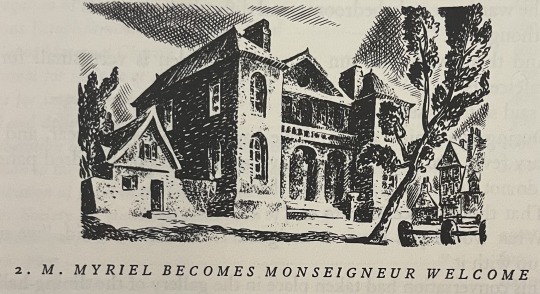
#my posts#les mis#les miserables#victor hugo#lascelles wraxall#wraxall translation#lynd ward#bishop myriel#lm 1.1.2
27 notes
·
View notes
Text
Brickclub I.1.2, “Monsieur Myriel Becomes Monseigneur Bienvenu”
Not a lot new to say about this chapter. The sense of history hanging over the story is made very literal in the commemorative plaque in the bishop’s palace.
And the themes of the book are pretty much spelled out in the bishop’s list of household expenses: prisoners--the improvement of their conditions, their relief and release, and prison diversion/prevention (the liberation of fathers of families imprisoned for debt); poor mothers; orphans and foundlings; the education of indigent girls; and the poor in general.
#brickclub#readalong#the bishop also dedicates half his carriage expenses to beef broth for the hospital#which seems like a lot#lm 1.1.2
12 notes
·
View notes